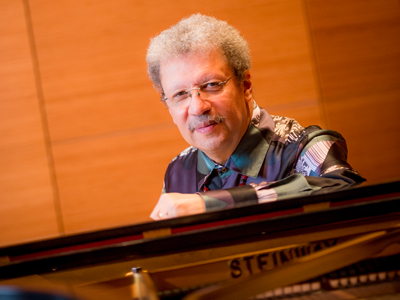Frost Opera Theater showcases the opera music of Anthony Davis

Excerpts from works by Anthony Davis were performed by Frost Opera Theater Monday night at UM Gusman Concert Hall.
Alan Johnson, director of the University of Miami’s Frost Opera Theater, has mounted many adventurous productions over the past decade. On Monday night at UM Gusman Concert Hall, Johnson presented a concert of excerpts from the operatic works of composer Anthony Davis.
The program showcased four outstanding vocalists in arias and scenes from four of Davis scores, spanning more than three decades. If the music did not always live up to the dramatic subject matter of the texts, the event provided a fine showcase for the formidable talents of former Frost Opera faculty and students.
A graduate of Yale University, Davis is a professor at the University of California, San Diego. He has also achieved considerable renown as a jazz pianist. Johnson first worked with the composer on the 1992 recording of X – The Life and Times of Malcolm X, Davis’ first foray into operatic composition. In many ways, Davis was in the vanguard of composers who eschewed stylistic definition in favor of a post modern mashup of jazz, atonality, minimalism and electronics.
Inevitably the absence of an orchestra in this type of program is a serious limitation. Piano accompaniment can only go so far in creating the aural undercurrents to the vocal lines, particularly in the work of contemporary composers. Despite Johnson’s best efforts and considerable pianistic prowess, the full impact of Davis’s work was shortchanged.
That was especially true in Act II, Scene I from X, which concluded the evening. In this pivotal excerpt, the imprisoned Malcolm Little is visited by his Islamic brother Reginald who sees religious conversion as Malcolm’s salvation. A resistant Malcolm eventually finds hope in Reginald’s vision of freedom and justice. The two men are then joined by Nation of Islam patriarch Elijah Mohammed in a declaration of faith. (Malcolm’s eventual break with Elijah Mohammed would lead to his assassination.)
The text for this segment by Thulani Davis is powerful and strongly characterized. Yet, shorn of instrumental and choral components, Davis’ setting emerged harsh and overemphatic, tending toward monotony. Bass Kevin Short as Malcolm and bass-baritone Carl Dupont as Reginald played off each other with theatrical punch and contrasting timbres. Dupont’s oaky tone and gentle determination contrasted with the fierceness of Short’s declamation and voluminous sound. The strength and pealing top notes of Andrés Lasaga’s tenor conquered Mohammed’s difficult high vocal line.
Short preceded that vignette with Malcolm’s Act I solo “You want the truth,” a stunning monologue, seething with anger, from the protagonist’s police interrogation sequence. Short’s deep low notes, clarity of diction and terrific declamation were heroic indeed.
The recitative “A black and tan fantasy” was a tease for The Central Park Five, Davis’ newest opera which will be premiered in June by Long Beach Opera. The Masque, a police officer, conveys his attraction to and hatred for Harlem to jazzy undertones. In pre-performance remarks, Davis noted that the instrumental writing tips a hat to Duke Ellington’s Harlem Suite.
Soprano Christine Jobson displayed her wide range in two pieces from Amistad (1997). In “I could tell by their looks, their touches,” Margru describes the horror of being captured by slave traders and separated from her baby. This is the stuff of potent music drama but Davis’ angular music falls short of capturing the heroine’s pathos. The moody introduction to “And one day they began to fall,” the Goddess of the Waters’ description of falling bodies during the Middle Passage, was promising but the scene goes on far too long and is unvaried in its agitation. Still Jobson’s exquisite top notes, substantial middle register and depth of dramatic projection proved riveting.
Four segments from Tania (1992), a satirical dark comedy about the kidnapping of Patricia Hearst by members of the radical Symbionese Liberation Army in the 1970’s, were the evening’s most appealing selections.
Johnson opened with an idiomatic keyboard itineration of the blues-tinged overture. The driving rhythm of “I’m the smoke in your jumbo jet” underscored the leader of the revolutionary group’s arc of rage. The duet “After the fire! And the funk goes that way,” underpinned by jazzy piano riffs, was almost like an Otello-Iago scena with one radical pushing another to take action in incisive tones. DuPont’s warm, light-textured bass-baritone contrasted well with Short’s fierce power in the scenes from both Tania and X. On his own DuPont spun a nice legato line as the character fantasized about Hearst as “Small white bird.”
During a postconcert question and answer session with the small but enthusiastic audience, Davis said he enjoys the collaborative nature of working with singers. He noted that he keeps voices in mind as he conceives new works. One can only hope that he and other composers will give these exceptionally gifted young artists, who worked hard to make his music come alive, the kind of vehicles that will be worthy of their talents.
The program will be repeated March 26 at the University of North Carolina at Charlotte and April 1 at the University of California, San Diego.
Posted in Performances
Leave a Comment
Tue Mar 19, 2019
at 2:33 pm
No Comments